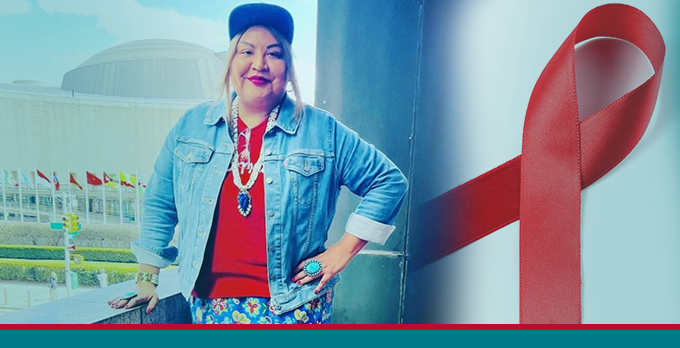A Native American health researcher and assistant professor in The University of New Mexico’s College of Population Health is uncovering new and critical information about the disparities in HIV prevention and care within Native American communities.

In addition to being a researcher and assistant professor Crystal Lee, PhD, MPH, MLS, is also a member of the Diné (Navajo) Nation and an accomplished public health expert, Lee’s work addresses health disparities affecting Native American populations. Her latest research, funded by Gilead, a global biopharmaceutical company known for developing innovative treatments for primarily infectious diseases, was completed in December 2023. This research explores the social and cultural factors that influence the acceptability of biomedical HIV prevention methods among Native American college students.
Lee’s work is critical based on Native American health disparities that stem from historical and present-day colonization, marginalization, and discrimination against Indigenous communities. As a result, Native Americans represent only 1% of the national HIV and AIDS cases, yet they rank third in new HIV diagnoses, following African American and Hispanic populations.
In 2021, Native Americans aged 25-34 had the highest percentage of new HIV diagnoses among all age groups, at 40%, up from 36% in 2020. During the recent American Public Health Association (APHA) conference held in Atlanta, representatives from the Navajo Nation Department of Health reported an increase in new HIV diagnoses over the past year, primarily due to a surge in injection drug use among Native American women. There is an immediate need to address HIV prevention.
Limited research has focused specifically on HIV prevention medication knowledge among Native American young adults in the United States, with most data emphasizing prevalence rates, risk factors, and general prevention efforts. Lee’s work addresses this gap by assessing medication knowledge among Native American college students and promoting culturally responsive HIV approaches.
Lee’s research specifically focuses on awareness and use of HIV prevention medications such as Pre-Exposure Prophylaxis (PrEP) and Post-Exposure Prophylaxis (PEP). PrEP is a daily prevention medication for individuals at high risk of HIV, including those with an HIV-positive partner, multiple sexual partners, or those who share needles. PEP is an emergency treatment taken within 72 hours after potential HIV exposure, such as unprotected intercourse or needle sharing, and must be used for 28 consecutive days to be effective.
A Native American advisory committee helped develop the comprehensive 30-page survey that included questions on health care access, cultural/social influences, and knowledge of HIV prevention methods like PrEP and PEP. The survey was open to Native American college students at both urban and rural institutions, including Tribal colleges/universities. This study survey dissemination began in the summer of 2022, when a partnering Native American organization, United Natives, had their youth council that comprised of a group of Native American college students assist Lee with distributing the study survey via their social media platforms. With the support of the youth council members, including Cheyanne Begay, Renae Blackwater, Erin Johns, and Brooke Betsuie, the research project reached the goal of obtaining 305 surveys completed by Native American college students nationwide within two weeks representing more than 100 tribes and colleges/universities across the U.S. with ages ranging from 18 to 57.
The data revealed insights into HIV knowledge and attitudes toward prevention methods among U.S. Native American young adults. The study found that half of the respondents had substantial knowledge about HIV, while fewer than 1% reported no knowledge. Medication knowledge varied by gender. Notably, male participants were three times more likely to know about PrEP compared with female participants. The study further discovered that individuals who had been tested for HIV before were four times more likely to know about PrEP and that heterosexual individuals were generally more familiar with PrEP compared with those of other sexual orientations. Awareness of PrEP was higher among those who attended a private or public four-year college compared to those who attended Tribal colleges/universities. Living arrangements mattered too — students with roommates were more likely to know about PrEP than those living alone or with family. While those at higher risk were more knowledgeable, the number of sexual partners did not impact awareness. Additionally, 62% of respondents indicated they would still use condoms while taking PrEP and 80% would do so when taking PEP.
Lee emphasized a critical point regarding health care access for Native Americans, stating, “a lot of the Indian Health Service clinics that are considered universal health care systems for Native Americans are not giving out PrEP.”
This observation highlights a gap in awareness rather than availability. While the Indian Health Service does offer resources for PrEP and PEP, many Native Americans within the community may not be aware of these services and resources.
The importance of access to health care resources cannot be overstated, particularly in relation to HIV awareness and education. Responses to the survey indicates that students who utilize campus health centers tend to have a greater understanding of HIV, suggesting that accessible health care services play a crucial role in improving health literacy. By increasing awareness of available resources like PrEP and PEP, the Indian Health Service can better equip Native Americans with the knowledge and tools necessary.
Building on her current research, Lee is now exploring options to enhance HIV service delivery through community pharmacies. She participated in developing and submitting an NIH proposal led by Bernadette Jakeman, PharmD, from UNM’s College of Pharmacy. The proposed study is to identify barriers to HIV testing and PrEP access from the perspectives of both pharmacists and patients, aiming to develop a sustainable model for HIV prevention services in community pharmacies, especially in areas serving Native American populations.
Lee’s pioneering research is crucial in addressing the HIV epidemic among Native American college students and broader Indigenous communities. By exploring the cultural and social factors influencing HIV prevention, her work lays the foundation for future initiatives to close gaps in education, prevention, and care, offering hope for reducing the HIV disparities affecting Native American populations.
